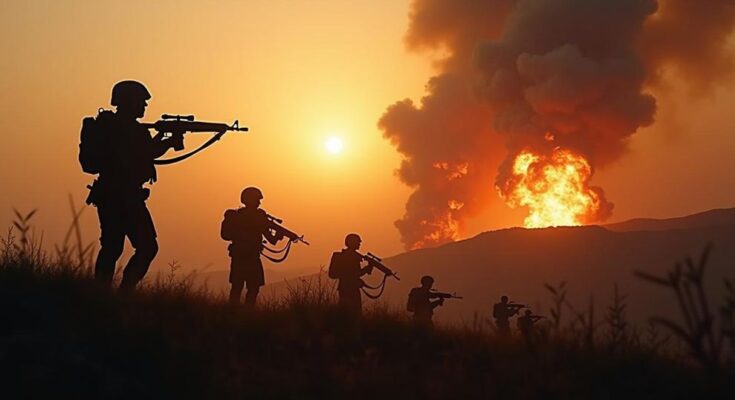The Israeli military has targeted Hezbollah positions in Lebanon following the confirmed killing of leader Hassan Nasrallah. Iran’s leadership has vowed to avenge this act, while the U.S. has described the assassination as a just retribution. The conflict has led to casualties and widespread condemnation, indicating a potential shift in regional balance.
On Sunday morning, the Israeli military reported that it had struck numerous Hezbollah “terror” targets in Lebanon, which included launchers aimed at Israel, following the announcement of the death of Hezbollah’s long-time leader, Hassan Nasrallah. His death was confirmed by the Iran-backed militant group just a day prior, amidst escalating regional tensions. Iran condemned the killing, vowing that it would “not go unpunished” and announcing five days of public mourning. Ayatollah Ali Khamenei, Iran’s Supreme Leader, stated that Nasrallah’s death “will not go unavenged.” United States President Joe Biden characterized the elimination of Nasrallah as a necessary “measure of justice” against what he referred to as a “40-year reign of terror,” reiterating his call for a ceasefire between Israel and Hezbollah. Significant developments from the previous day included the Israeli military’s announcement that it had successfully “eliminated” Nasrallah during an airstrike in Beirut. In addition to Nasrallah, several other key Hezbollah commanders were reportedly killed in this attack, notably Ali Karki, commander of Hezbollah’s southern front. Following the strikes, Lebanon’s health ministry reported at least 33 fatalities and close to 200 injuries as a consequence of Israel’s ongoing military operations against Hezbollah in Lebanon.
The current situation in the Middle East is marked by renewed intensity in the long-standing conflict between Israel and Hezbollah, particularly following the assassination of Hezbollah leader Hassan Nasrallah. His leadership and actions have been pivotal in the group’s resistance against Israel, making his death a critical development expected to alter the power dynamics within the region. Iran’s vocal opposition and promise of retribution highlight the broader geopolitical implications of this conflict, as Iran has historically positioned itself as a backer of Hezbollah, increasing tensions further.
In summary, the death of Hassan Nasrallah has sparked significant military responses from Israel against Hezbollah targets, deepening the conflict in the region. With Iran pledging to avenge his death and the U.S. administration calling for a ceasefire while framing Nasrallah’s killing as just, the situation presents a complex array of political and military challenges. The regional balance of power may shift considerably as these events unfold.
Original Source: www.france24.com




